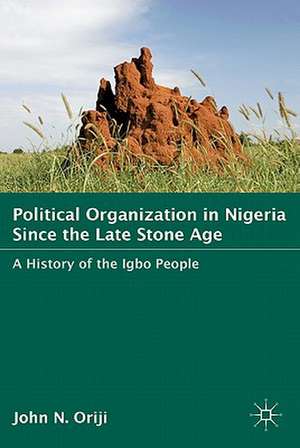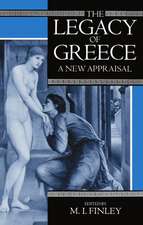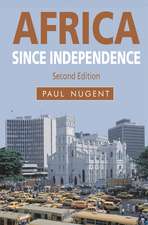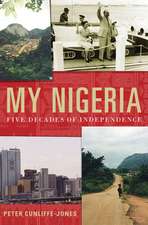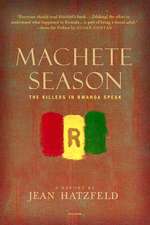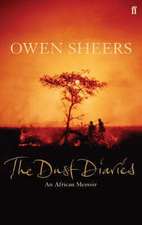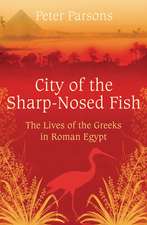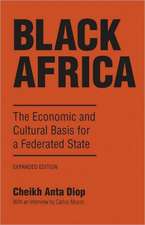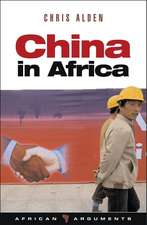Political Organization in Nigeria since the Late Stone Age: A History of the Igbo People
Autor J. Orijien Limba Engleză Hardback – 4 ian 2011
| Toate formatele și edițiile | Preț | Express |
|---|---|---|
| Paperback (2) | 384.48 lei 6-8 săpt. | |
| Palgrave Macmillan US – 4 ian 2011 | 384.48 lei 6-8 săpt. | |
| Palgrave Macmillan US – 20 ian 2015 | 417.86 lei 6-8 săpt. | |
| Hardback (1) | 386.39 lei 6-8 săpt. | |
| Palgrave Macmillan US – 4 ian 2011 | 386.39 lei 6-8 săpt. |
Preț: 386.39 lei
Nou
Puncte Express: 580
Preț estimativ în valută:
73.94€ • 79.06$ • 61.65£
73.94€ • 79.06$ • 61.65£
Carte tipărită la comandă
Livrare economică 17 aprilie-01 mai
Preluare comenzi: 021 569.72.76
Specificații
ISBN-13: 9780230621930
ISBN-10: 0230621937
Pagini: 248
Ilustrații: X, 248 p.
Dimensiuni: 140 x 216 x 18 mm
Greutate: 0.38 kg
Ediția:2011
Editura: Palgrave Macmillan US
Colecția Palgrave Macmillan
Locul publicării:New York, United States
ISBN-10: 0230621937
Pagini: 248
Ilustrații: X, 248 p.
Dimensiuni: 140 x 216 x 18 mm
Greutate: 0.38 kg
Ediția:2011
Editura: Palgrave Macmillan US
Colecția Palgrave Macmillan
Locul publicării:New York, United States
Cuprins
Introduction Igboland Before and During the Iron Age: From Stateless Societies to Mini States The Igbo and their Neighbors Before the 15th Century The Igbo and the Benin, Igala and Eastern Ijo Mega States during Trans-Atlantic Slave Trade The Aro Trade Network: Changes in Igbo Society from the 18th -19th Centuries Abolition of the Slave Trade and the Genesis of Legitimate Commerce, Christianity and the New Imperialism Developments in Igboland from the 1890s 1970s Conclusion
Recenzii
'Recommended.' - CHOICE
"This book can be regarded as a pioneer study of the Igbo political organizations to the extent that no other study has in a systematic and sustained manner gone as far back as tracing the genesis of such political structures to the origins of the Igbo people. The periodization is quite revealing and very significant. It addresses one of the major limitations of most existing studies on the Igbo which lump the history of the people before European colonial rule under one bloc of time, 'pre-colonial.' Such studies fail to recognize the changing dynamics of a period in Igbo history which witnessed so much change and adaptation as this study has demonstrated. These observations underscore the significance of this book and its originality." - Gloria Chuku, Associate Professor, Africana Studies Department, University of Maryland, Baltimore County
"By focusing on the longue durée and on change over time, this book transforms our understanding of Igbo political history. John Oriji's prodigious research, comparative method, and historical approach sweep away old assumptions about the Igbo as a supposedly 'stateless' people who lived in an 'acephalous' society. This work marks a new beginning in the historical study of Igbo political systems, and is a welcome addition to Igbo studies, Nigerian historiography, and African history generally." - Douglas B. Chambers, Associate Professor of African History at the University of SouthernMississippi and author of Murder at Montpelier: Igbo Africans in Virginia
"In this timely book John Oriji uses the diachronic and multi-disciplinary approach to explain changes undergone by Igbo political systems since the Late Stone Age. It is a courageous tour-de-force that threads deftly - and triumphantly - along the rugged and uneven terrain of Igbo history. It deserves to be widely read." - G. N. Uzoigwe, Professor, Formerly Dean, College of Humanities and Social Sciences, Imo State University; Head, Department of History, Mississippi State University
"This book can be regarded as a pioneer study of the Igbo political organizations to the extent that no other study has in a systematic and sustained manner gone as far back as tracing the genesis of such political structures to the origins of the Igbo people. The periodization is quite revealing and very significant. It addresses one of the major limitations of most existing studies on the Igbo which lump the history of the people before European colonial rule under one bloc of time, 'pre-colonial.' Such studies fail to recognize the changing dynamics of a period in Igbo history which witnessed so much change and adaptation as this study has demonstrated. These observations underscore the significance of this book and its originality." - Gloria Chuku, Associate Professor, Africana Studies Department, University of Maryland, Baltimore County
"By focusing on the longue durée and on change over time, this book transforms our understanding of Igbo political history. John Oriji's prodigious research, comparative method, and historical approach sweep away old assumptions about the Igbo as a supposedly 'stateless' people who lived in an 'acephalous' society. This work marks a new beginning in the historical study of Igbo political systems, and is a welcome addition to Igbo studies, Nigerian historiography, and African history generally." - Douglas B. Chambers, Associate Professor of African History at the University of SouthernMississippi and author of Murder at Montpelier: Igbo Africans in Virginia
"In this timely book John Oriji uses the diachronic and multi-disciplinary approach to explain changes undergone by Igbo political systems since the Late Stone Age. It is a courageous tour-de-force that threads deftly - and triumphantly - along the rugged and uneven terrain of Igbo history. It deserves to be widely read." - G. N. Uzoigwe, Professor, Formerly Dean, College of Humanities and Social Sciences, Imo State University; Head, Department of History, Mississippi State University
Notă biografică
John Oriji is Professor of African History at California Polytechnic State University, USA. His publications include Traditions of Igbo Origin (1994), Ngwa History (1998), numerous articles in professional journals, and chapters in books discussing diverse themes in African history ranging from oral traditions and sacred centers to the slave trade and colonialism.
